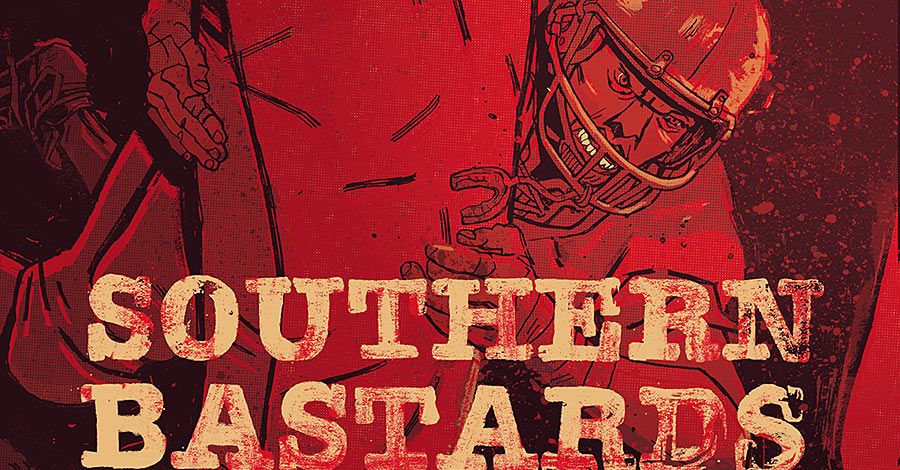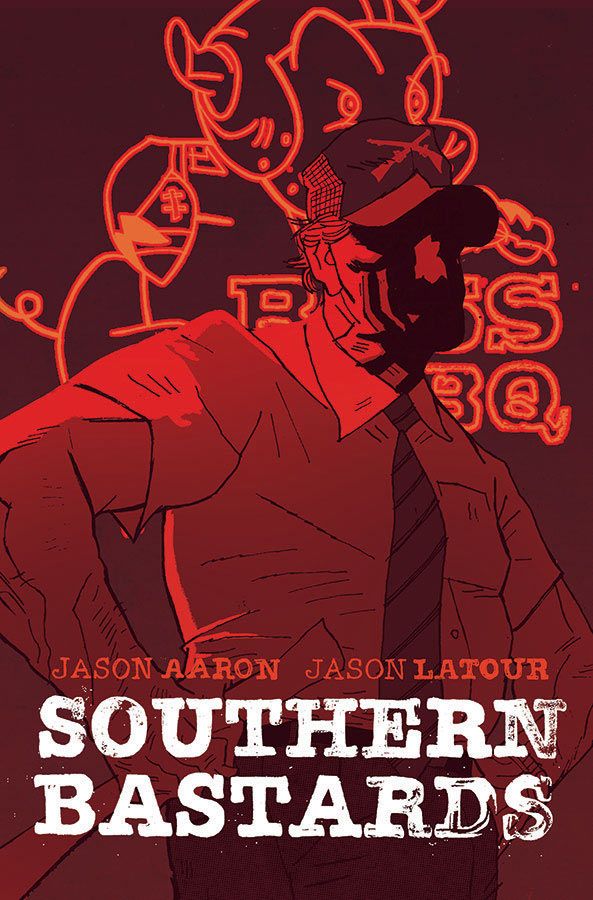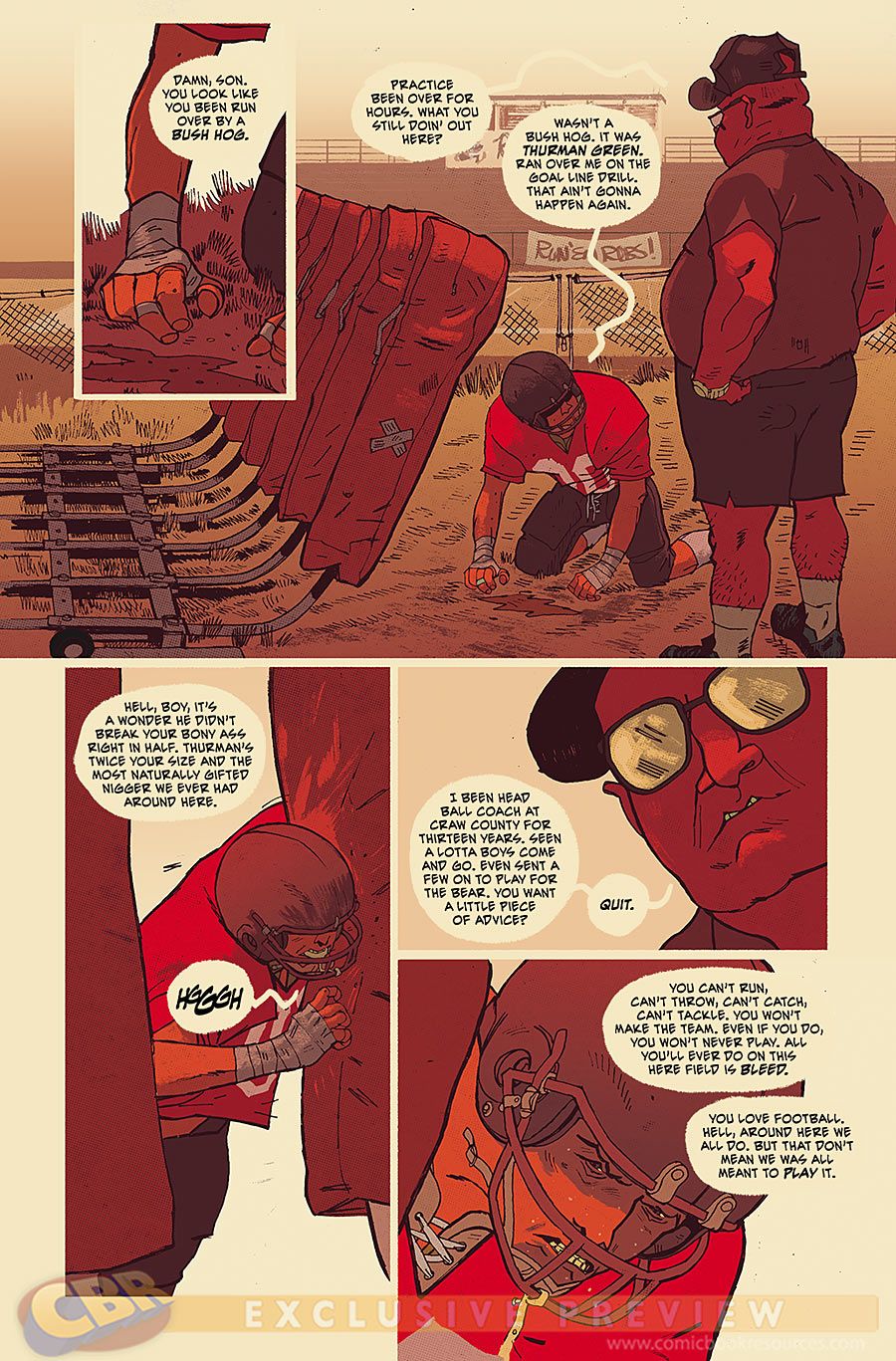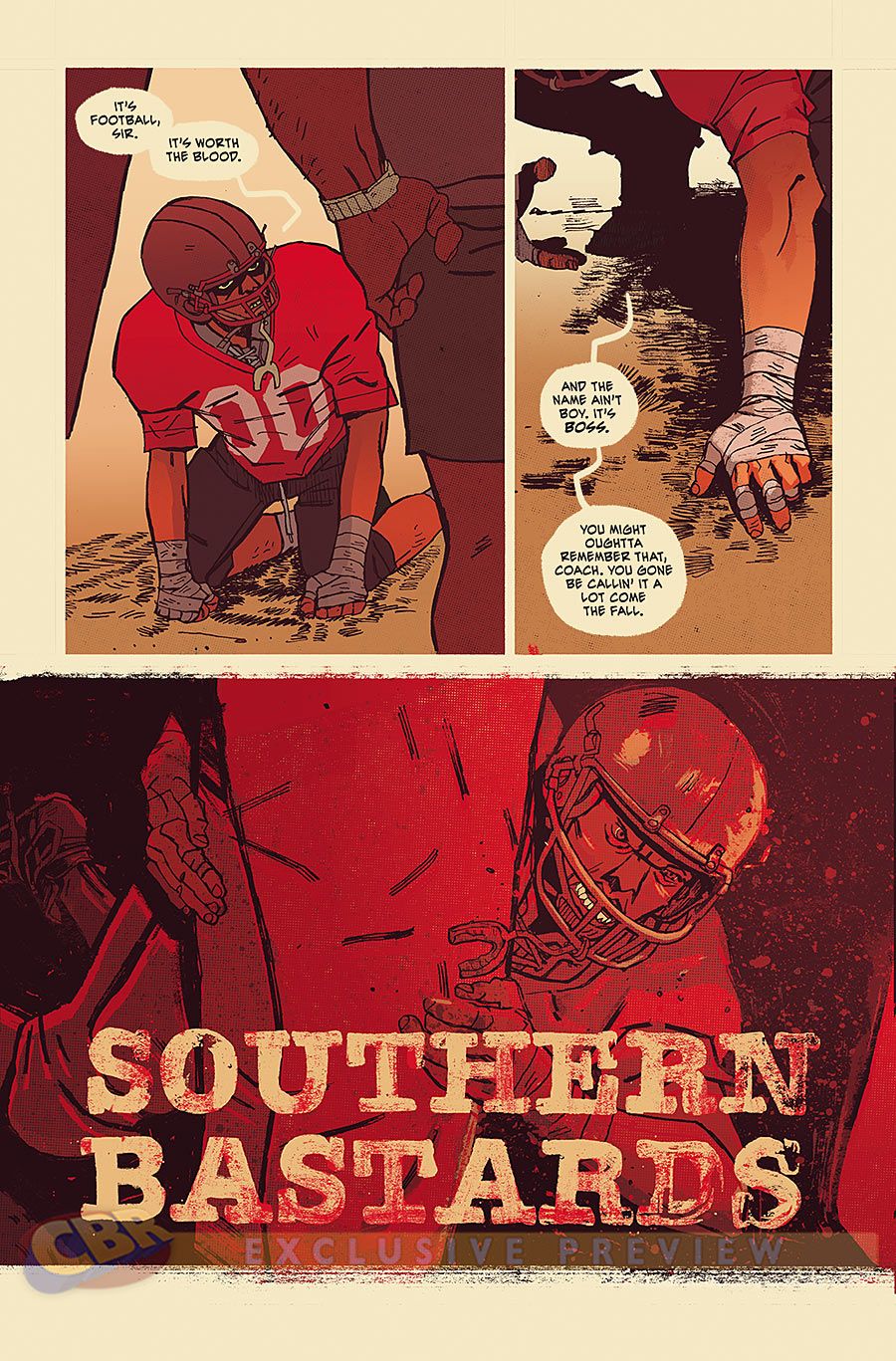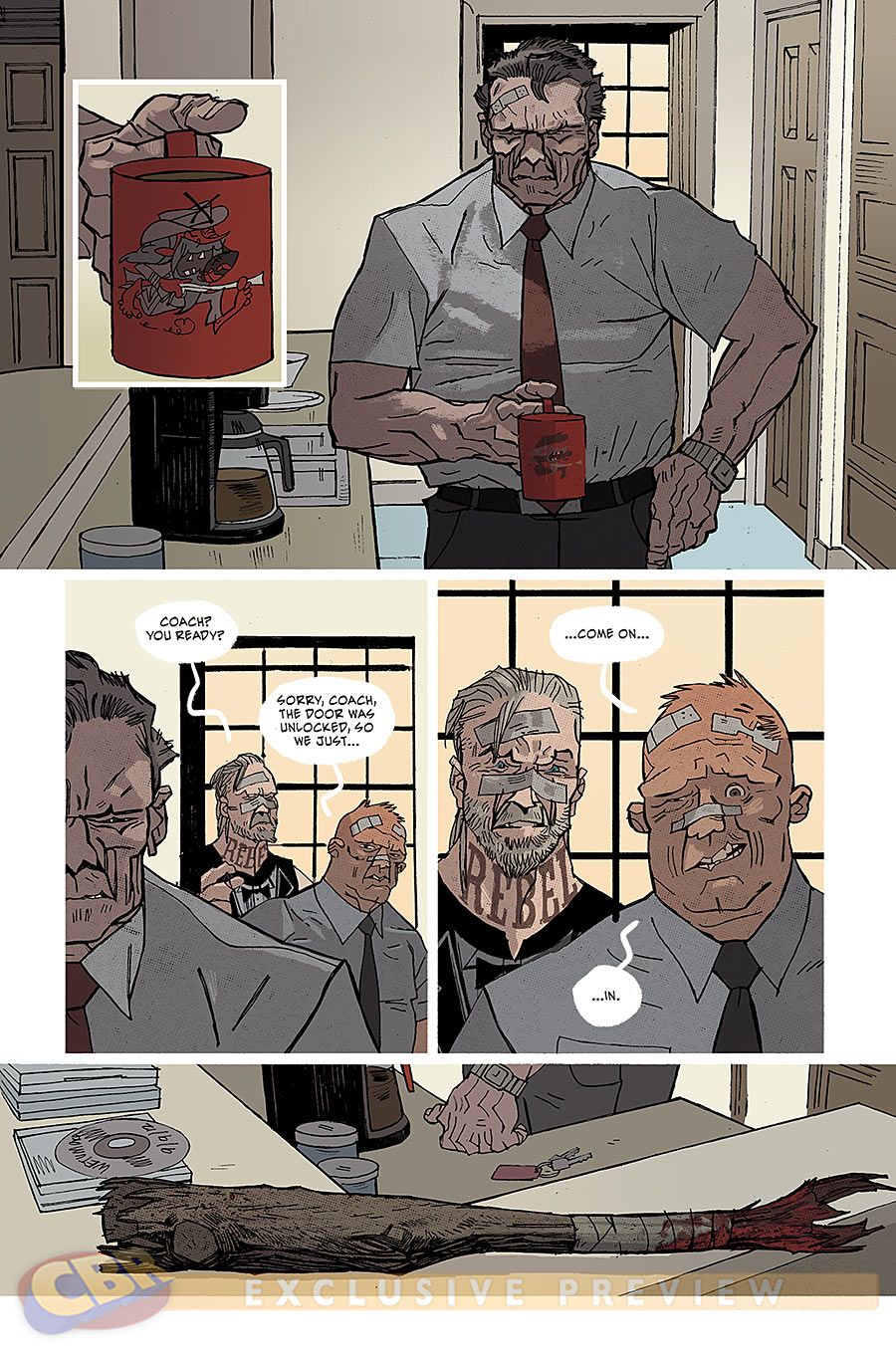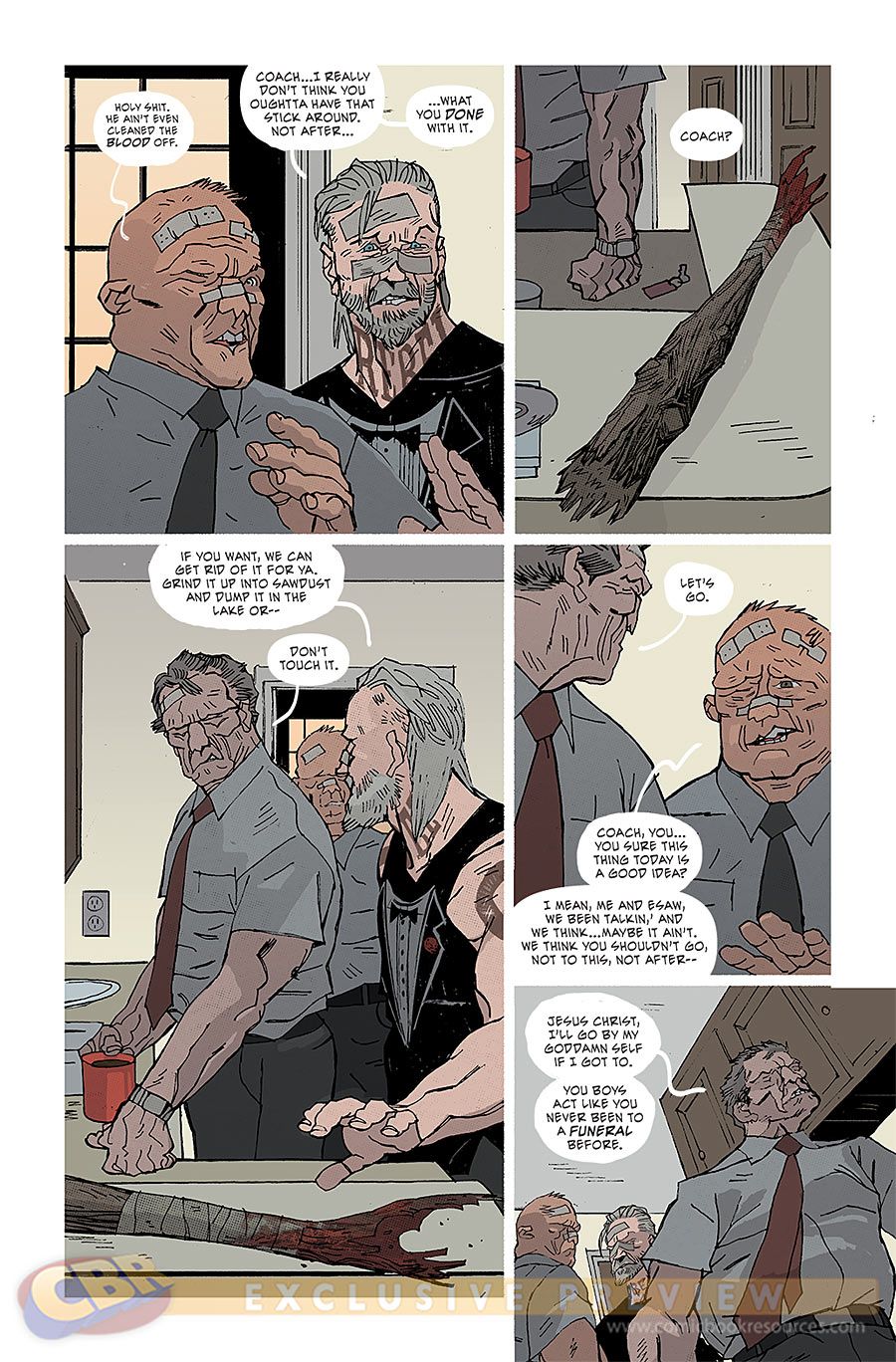The 1973 film "Walking Tall" dramatized the life of Sheriff Buford Pusser and showed filmgoers what happens when one man tries to clean up a corrupt Southern town with grit, determination, and a very big stick. Over the years that story has been retold numerous times and in numerous forms, and when writer Jason Aaron and artist Jason Latour kicked off the creator-owned "Southern Bastards" series from Image Comics it looked like they, too, were putting their own modern day spin on the story.
Aaron Serves Up a 'Morally Ambiguous' Tale in "Southern Bastards"
When readers saw club-carrying Earl Tubb fall in his crusade against Euless Boss, the high school football coach and crime lord who controls Craw County, Alabama in the book's fourth issue, it quickly became apparent that Aaron and Latour are telling a story that's more about community and family than it is about one man's struggle with "Southern Bastards." CBR News spoke with Aaron and Latour about the shocking climax to "Southern Bastards" #4, some of the characters readers will meet as the series moves forward and the book's subtle surreal and supernatural elements.
CBR News: Jason and Jason, I think the first thing we should do is start with sort of a public service announcement. For those who stopped reading at the credits page of "Southern Bastards" #4, they should go back and read the issue's final two pages. And while Earl Tubb appears to have died, this series is an ongoing and not a limited one.
Jason Aaron: [Laughs] Yeah, hopefully nobody straight up stopped; like they got angry, threw the book down in disgust, and didn't turn the page. Hopefully people made it to that epilogue.
I mean, we did want it to feel like the book was over at that point. You hit that last splash page and then the credits page and you think, "Shit! What just happened?" Then you flip the page and see the epilogue, which is an answer to a question that's been in the book since the opening scene of issue #1. That opening scene is Earl driving into town, talking on his phone, leaving a message for someone. He continues to call and leave messages for that unknown person in every issue of the book. So that mystery had clearly been building. And really, I was worried by issue #3 that it was probably starting to be pretty obvious that Earl was headed for something really bad.
Jason Latour: I'm actually okay with someone throwing the book in the corner because that means they care. There were a few whispers from readers who thought we were just going to do a by the numbers Buford Pusser story and felt that it was telegraphed and hackneyed. It's been fun laughing at them silently. I've wanted to screen cap all those comments.
What made you want to set up the initial arc like this? Earl's apparent death and the reveal of his daughter in the epilogue to issue #4 takes the story of "Southern Bastards" in some new and unexpected directions.
Aaron: This was always the plan for the book. The biggest clue was right there in the title: "Southern Bastards." This was always meant to be a book about the bastards. The premise of the series is that there's a county in Alabama where the bad guys have won. A whole county full of bastards. So I always liked the idea of setting this up to look like it's gonna be "Walking Tall." That this is going to the story of this tough old guy who comes in and cleans up this county by swinging a big stick.
Then you get to the end of the first arc and you see that no, this isn't going to be that kind of story. This isn't "Walking Tall." This isn't a story where a good guy comes in and saves the day. This is where the bad guys have taken over. So that was always the idea, but we also liked the idea of setting up another sort of revenge story, or at least the tease of it here at the end of the first arc. So you know that even though Earl has failed in his mission, there is someone else out there who is going to have a very personal interest in what just happened.
Latour: Neither of us has ever been particularly interested in telling a white hat kind of hero's journey. Even when I buy into that stuff I'm always waiting for the other shoe to drop. So I'm a bit surprised that we managed to get people as invested as we did. But I'm proud of the fact that it seems to have registered so strongly. If there are people who are mad at us or are still on the fence -- well,
look -- no one loved Earl Tubb more than us. Drawing those final pages was heartbreaking for me. But I think in its way his death was both meaningful and honorable. He definitely won't be silently forgotten...
CBR TV: Aaron Talks Female "Thor," "Star Wars" at Marvel & Creator-Owned Success
Speaking of people not likely to forget Earl's death, in those last two pages of "Southern Bastards" #4 we get our first glimpse of Earl's daughter as she finally catches up on the messages her father has been leaving her and calls him back. Are you able to reveal her name yet? And she appears to be a Marine who loves and tries to stay in touch with her father, so she's closer to Earl than he was to his father? What's their relationship like?
Aaron: I want to hold off on revealing her name or much about her, but yes she would appear to have a better relationship with Earl than Earl had with his own dad. That's not to say that they haven't had their own issues over the years.
I think you can go back and look at the messages Earl had been leaving for her, and they'll tell you a little more about their relationship.
Earl does seems a bit needy in those phone messages.
Aaron: Right, she's the only person he's calling and maybe the only person he has to call. Judging by the messages there are still things he wishes he could have told her or said to her. He pretty much says he wasn't the best of fathers when she was growing up.
Talking about Earl's daughter begs the questions of who her mother is and where is she?
Aaron: Yes, there's no mention or reference so far of the Mother. All we know for sure about Earl is that he left Craw County and went to Vietnam sometime in the late '60s or early '70s. Not long after that his father died, and Earl hasn't been back since his father's funeral. He moved off to Birmingham and has been gone from Craw County ever since.
As to what he's been up to in that 40-year gap? We don't really know other than he's got a daughter.
Latour: My money is on her being the daughter of Earl Tubb and a hurricane.
[Laughs] So the past 40 years and perhaps even before is just as important to "Southern Bastards" as the present?
Aaron: It certainly will be as it relates to Earl's daughter. She's a character we'll learn more about as things go along. Issue #5 won't be her story. That's something that's going to develop over time.
Are there plans for issues that flashback to Earl's past? Or the past of his father, the legendary Sheriff of Craw County, Bert Tubb?
Aaron: We'll for sure get flashback issues at some point that show Bert back in his heyday. As for other flashbacks? We're not sure yet. We definitely want to show the history of Bert Tubb as it relates to Craw County. We want to show the story of how this county became the way it is and a lot of that goes back to the days of Sheriff Big Bert Tubb.
Latour: I don't know if or where it fits yet, but since day one I've wanted to tell Bert's story. It just feels like it's a really rich setting that we can take advantage of as a comic book. History is an open book to us, so maybe we will get to dive back into it eventually.
Aaron: Plus, I just wanna do a story about bootleggers driving fast cars.
So eventually we'll find out more about Bert, Earl's daughter, and several other Craw County residents as this series moves forward. That suggests to me that "Southern Bastards" isn't a book about one or two characters. Is this a book about the larger community of Craw County as a whole?
Aaron: Yeah, absolutely. We just killed the guy who seemed to be the main character of the book. That should tell you it's going to be about lots of different people. We still haven't even met all the important characters of the book. In issue #5 we'll get a glimpse of some other important folks, as we begin an arc that focuses in on Coach Boss, the guy who seems to be the main villain of the story.
One character I'm curious about that played a role in the first arc is the dog that wandered the town and helped Earl out in his final battle in issue #4. What can you tell us about the dog?
Aaron: There seems to be something rather important about that dog, doesn't there? It's certainly more than just the joke it maybe originally seemed, when it was taking a crap on the very first page of the series. The dog popped up in a lot of key moments throughout those first four issues, but as for why, I'll leave that up for people to decide for themselves.
I like the idea that in "Southern Bastards" there's sort of this big question mark in terms of the supernatural. You can look at the lightning striking the tree and Earl pulling a stick out of it at the end off issue #2 as a very supernatural moment. So are there supernatural forces at work in this story? Maybe. Maybe not. I think you can read it either way.
Is there something special about that dog? Or is it just some mangy mutt that shows up from time to time and barks and poops a lot? Who knows? I'll just say we certainly haven't seen the last of the dog.
CBR SUNDAY CONVERSATION: Jason Latour's Southern Roots
Let's move from story to visuals. Jason L, you're primarily known as a writer these days. How does it feel to have a book like this in addition to the titles you're writing where you can stretch your artistic muscles on a regular basis?
Latour: Am I known as a writer? It's funny because I don't really know anymore. I'm always kind of flattered when someone knows my work in either capacity. I've at times felt kind of relegated to being an "artist's artist" for a long time. That's the nice way of putting it, most people saying that usually mean "I like his work, one day maybe he'll get his shit together."
But yeah, drawing is good for me. I feel like I'm just scratching the surface of my ability as a writer, but I'd never have made it this far without drawing comics. So it's nice to sit down and slug it out with the page. And with a story like this, it's so unique in its challenges -- I feel like it needs all of me. That's tough, but if you're the kind of masochist that enjoys making comics it's the best place to be.
You designed Craw County. What inspired the look and feel of the area and its residents? What was it like designing the people and places of "Southern Bastards?" Do you enjoy design work?
Latour: Well, I think that's really what the "design" of the book all revolves around is trying to make the right choices by distilling my own experiences and views. I've talked a lot in the past about how it's really a place that only exists in our minds. So hopefully what goes on the paper is governed by something, be it subconscious or given a reason in hindsight that doesn't matter so much -- but something that makes it feel authentic to some degree. At least emotionally. I've tried to work hard to get good enough at drawing and my process that I can mostly forget both and focus on communicating the story. That's what I enjoy about it doing comics. It generally seems more rewarding that way.
You don't just draw "Southern Bastards." You also provide the colors. In the fist arc the most predominant color in the palette you chose is red. Why did you choose that color?
Latour: I'm not sure I have a clear answer for that. It seems a pretty common thing for most people who paint or color comics to kind of go in and out of phases with the colors they choose. Red is a very challenging color, especially in print. I don't want to get too hoity about it but maybe that's why. When you're working with a color so direct and powerful, it really does make nuance matter all the more. That seems pretty fitting given what this book is.
You guys have been friends for a number of years and have collaborated on a number of books in the past. How does it feel to be working on your first creator-owned book together?
Aaron: It's great. It's a very different sort of experience when you're making a comic with somebody that you know well. To me, that's kind of the coolest and most important part of doing creator-owned comics; that relationship with the artist. When you're putting together your own book and can work with whoever you want, of course I'm gonna wanna work with somebody I know, somebody I have a real relationship with. Work-for-hire comics can be a bit like a one night stand, in terms of collaboration. With something creator-owned, it's like we're having a baby together. God help me, I've chosen to have a baby with Jason Latour.
So yeah, working with him has been a huge thrill. I already knew Latour was a super talented guy from the stuff we'd done together, like "Scalped" and "Wolverine," and some of the other stuff he's been doing himself, like the Marvel stories he's drawn here and there over the last few years, and the stuff he's written, like "Winter Soldier" and "Loose Ends." He's an incredibly passionate, incredibly intelligent guy, who's got great ideas coming out his ears. He's also funny as hell, and I think you see that humor bleeding into "Southern Bastards" from time to time. I think this is probably one of the biggest things he's done so far in comics and hopefully a lot more people are getting turned on to how talented a dude he is.
As things go forward you should start to see even more of those talents on display in "Southern Bastards," as I'm hoping that Latour will write some issues as well. But no, unfortunately that doesn't mean that I'll be drawing any. Not unless I enroll in some art classes right away. We probably will use some other artists here and there though. But Latour will always be the main artistic voice of the series.
Latour: You know in "The Simpsons" when Homer chokes Bart? Well I'm definitely Bart in that equation.
Seriously though, most of what I have to add would just echo what Jason's already said. He writes the kinds of scripts that can't help but make you better, and he's got a openness and a patience and humility that's unmatched for his talent and station in the business. I'm real proud to work with the dude.
Hearing you talk about how there will be certain issues where other creators will handle the art duties and that Jason L will write some issues reminds me of how Kieron Gillen and Jamie McKelvie described their work on "Young Avengers." They said they thought of it as sort of a gang mentality project where the book was primarily their vision, but sometimes their friends would stop by and help add to that vision.
Aaron: Yeah, absolutely. No matter what though, Latour and I will always be the creators on this book, and we are very much co-creators in every sense of the word. We own everything together and build everything together.
A lot of people talk about that creator-owned brand and throw that term around, but not all creator-owned books are created equal. To me, creator-owned should always mean "creators-owned." It takes two to make a baby, right? Latour and I are very much equal co-creators and that's not just in name. We own all of this together 50-50.
We also create everything together. You can't go into the book and pick out my contributions and his because everything will fall apart. It's very much been a marriage of ideas with this series. That's kind of the cool thing about doing comics like this, right? You take a couple of creators and mix together their separate ingredients to create a unique sort of stew.
With a book like this every month there are four of us [along with letterer Jared K. Fletcher and editor Sebastian Girner] putting it together. Then we hand it off to Image. So that's a pretty cool thing. Just a few people can get together and make a comic, and then a few weeks later it's out in the world where people are reading it and responding to it. We don't really have to worry about what anybody else thinks or says beyond that little group of folks. That's really the coolest part of doing creator-owned comics.
And again, I like the idea of creators (plural)-owned comics as opposed to just writer-owned comics. I think that's the banner we should be waving. I could never have done this book with anyone else. Latour was the only artist I ever talked to about it. The only artist I ever thought of for it. And without him or with someone else, it wouldn't be the same series.
Finally, you already mentioned the next arc focuses heavily on Coach Euless Boss. What else can you tell us about the arc? How much story time passes between the end of issue #4 and #5?
Aaron: The next arc is called "Gridiron" and issue #5 picks up not long after the end of issue #4.
I've had people asking me if Earl is dead at the end of issue #4 or not. Including my mom, who's been giving me loads of shit ever since that issue came out. If you still have that question, I'll just say that it will be answered definitively in issue #5.
Other than that, we'll explore more of Coach Boss in the present day. All we know about him so far is that he's a high school football coach and he seems to somehow be in control of the town, including the seedier elements, but beyond that we don't really know what he does, what's he involved in, and what he's up to. So we'll start to get some answers to that. We'll also flashback to see him as a very young kid going out for the football team for the first time. So we'll start to get the secret origin of Coach Boss as a young football player, and see how that led to him becoming the most powerful and feared man in Craw County.
"Southern Bastards" #5 goes on sale October 29 from Image Comics.

